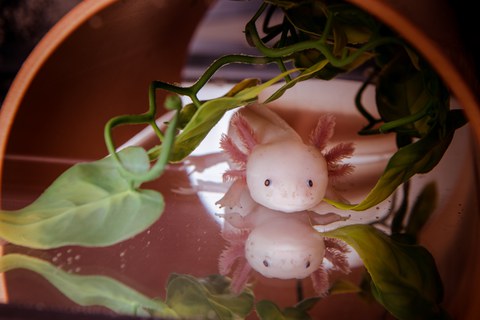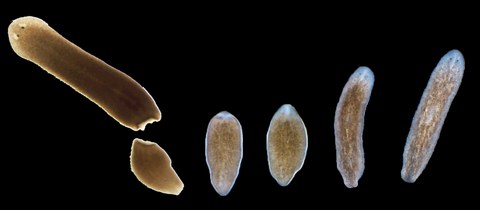Mar 15, 2018
A First in the German Research Landscape. An internal partnership under civil law between TU Dresden and the Max Planck Institute enables the use of research synergies

Jüngst publiziert in der Fachzeitschrift „Nature“: die Genome des mexikanischen Salamanders Axolotl und des Plattwurms Schmidtea mediterranea wurden kürzlich durch Dresdner Wissenschaftler des DCGC zum ersten Mal vollständig sequenziert.
The signatures of the Rector of TU Dresden and the Managing Director of the Max Planck Institute of Molecular Cell Biology and Genetics (MPI-CBG) made the internal partnership under civil law (German: BGB-Innengesellschaft) for the joint creation and operation of the DRESDEN-concept Genome Center (DCGC) official. This internal partnership represents a novel form of cooperation in the German research community, enabling the synergetic use of complex and expensive research infrastructure.
Established in 2013, the DCGC is an amalgamation of TU Dresden and MPI-CBG employees, bundling the Dresden-based expertise in the field of gene sequencing. This association guarantees that genome analysis processes and methods are made available to as many scientists as possible within the DRESDEN-concept research alliance.
The DCGC is located in the DFG Center for Regenerative Therapies Dresden (CRTD), a Cluster of Excellence at TU Dresden, and is comprised of four methodological areas: DNA sequencing with an emphasis on Next Generation Sequencing (long and short read technologies), gene expression profiling, single-cell analyses and DNA recombineering. A core scientific goal is the creation and primarily the further development of different Next Generation Sequencing technologies. The main focus is the “Single Molecule Real Time” (SMRT) sequencing method that enables both the decoding of hitherto unknown genomes and the facilitation of clinical genetics studies, which are dependent on such high-precision sequencing methods.
Prime examples of the success of DCGC are the two recently published articles in the scientific journal “Nature”: the genomes of the Mexican salamander Axolotl and the flatworm Schmidtae mediterranea – both of them true champions of regeneration – have been fully sequenced for the first time.
On the webpage “Dresden Technology Portal”, scientists of the DRESDEN-concept research alliance can view the analysis methods developed at the DCGC as well as the shared services, equipment and infrastructures, and arrange for their utilisation.
What is DRESDEN-concept?
DRESDEN-concept is an alliance of 26 local partners from science and culture. The cooperation within DRESDEN-concept aims to develop and utilise synergies in the fields of research, education, infrastructure, administration and transfer. For this purpose, the partners coordinate their scientific strategy and identify areas in which Dresden is an international leader. The members work together to attract the world’s most renowned scientists to Dresden and retain them at the science location.
About MPI-CBG
The Max Planck Institute of Molecular Cell Biology and Genetics (MPI-CBG) is one of 84 institutes of the Max Planck Society, an independent non-profit organisation in Germany. 500 researchers from 50 countries work at the MPI-CBG. They are driven by their scientific curiosity and strive to explore the question: “How do cells organise into tissue?” The institute brings together people from a broad range of academic disciplines in order to gain novel insights and findings.
About CRTD
Established in 2006, TU Dresden’s Center for Regenerative Therapies Dresden (CRTD) explores the self-healing potential of the human body with the goal of developing completely new, regenerative therapies for hitherto incurable diseases. The research focuses on haematology, immunology, diabetes, neuro-degenerative diseases and bone regeneration. The CRTD is part of the Center for Molecular and Cellular Bioengineering (CMCB).
Technology Portal: https://tp.dresden-concept.de/
DRESDEN-concept: http://www.dresden-concept.de/
CRTD: http://www.crt-dresden.de/
CMCB: http://www.tu-dresden.de/cmcb
MPI-CBG: https://www.mpi-cbg.de
Media inquiries:
Tobias Mahn (MSc./MBA)
Technische Universität Dresden
Institutional Strategy / Dresden Technology Portal
Tel.: +49 (0) 351 463-33564

